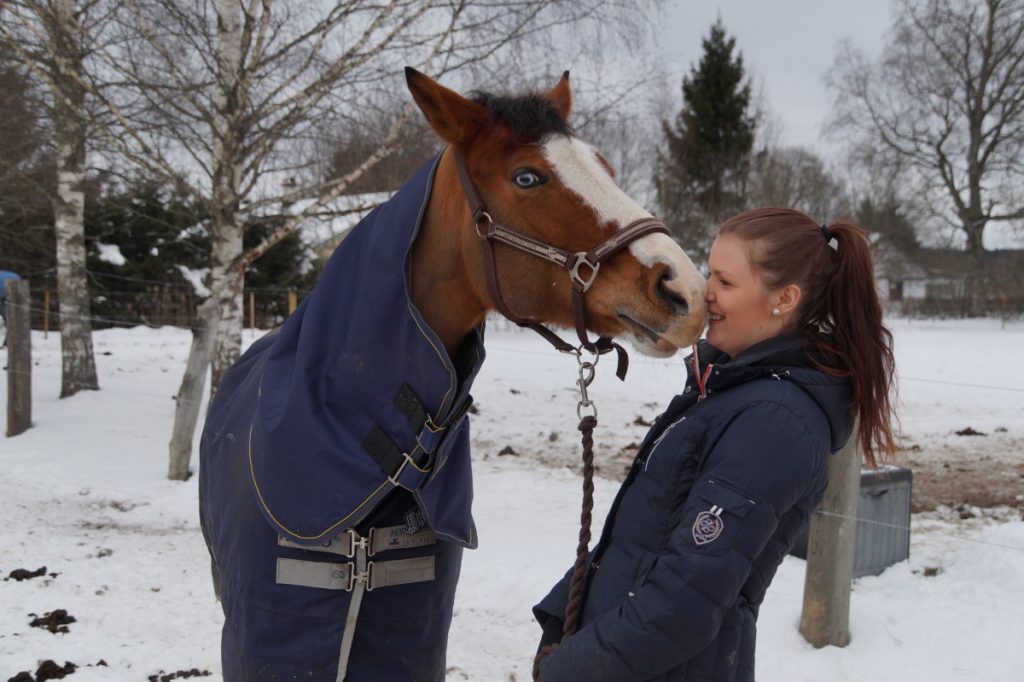Horses have wildly different personalities depending on the individual horse, and some of them are more prone to licking their riders than others. A mouthy horse can mean many different things since horses don’t usually lick people in the same way that a dog might.
So what does it mean when your horse licks you? In most cases licking in horses is a neutral behavior and can be ignored, but licking has the potential to lead to biting behaviors in some horses. Horse licking behaviors can result from several reasons, such as:
- Affection
- Grooming
- Salt deficiency
- Treat scavenger hunt
- Anxiety
- Gastric ulcers
- Submission
- Personality quirk
- Boredom

Knowing whether it’s okay to let your horse lick you is mostly a matter of knowing your horse’s personality and how they communicate with you. Read on to find out more about horse licking and why it occurs.
Why Does My Horse Lick Me?
Horses lick for many different reasons, and some of them may lick people or objects for no discernable reason at all. Here are some of the observed causes of horse licking behaviors:
- Affection: While horses don’t display affection with licking as often as dogs do, some very friendly and dominant horses may get into the habit of licking their riders, especially during grooming behaviors or when feeding treats. Since humans often interpret horse licking like they do dog licking (as affection), they show affection to the horse in return, reinforcing the behavior.
- Grooming: Horses participate in allogrooming, which is grooming behavior that is used as a bonding behavior between individuals in an animal hierarchy. That means, in many cases, when a horse gently licks their owner, they are treating their owner with a closely-held bond within the herd structure. Many horses also enjoy grooming activities performed by humans since they imitate these same licking behaviors.
- Salt deficiency: One primary reason that horses lick their riders is that they are attracted to the salt that is exuded from the surface of our skin. If a horse is adamant about licking skin, especially after hot, sweaty rides, you might want to make sure that you have adequate salt licks and mineral supplements available to your horse. Lack of salt can drive a horse to lick.
- Treat scavenger hunt: If you are in the habit of bringing treats to the pasture for your horse, this can lead to a horse that frisks you with its tongue every time you step into the stables. As long as it is done gently, this can be a cute behavior, but more dominant horses may abuse the privilege, so it is a behavior that should be observed for signs of aggression.
- Anxiety: Equine behaviorists note that licking behaviors can be a relaxation reflex, equivalent to a sigh of relief in human behavior. Licking or mouthing can be a sign of a drop into a less tense mental state after a horse has been startled, confused, or excited by kinetic movement (such as being ridden or driven around a ring). These kinds of cues are common in prey animals.
- Gastric ulcers: In some cases, horses may reflexively lick in an attempt to produce excess saliva, and this can be in response to gastric ulcers. Gastric ulcers are common in horses, especially racehorses and other horses that have to perform at a high athletic level. If a horse begins licking excessively all of a sudden, it can be a sign they need veterinary attention to rule out ulcers.
- Submission: Licking in horses can sometimes be indicative of submissive behavior, especially if the horse is cornered in a stall or other area where it cannot flee. When paired with a lowered head, licking or mouthing gestures can communicate that the horse is trying to adopt an infantile posture to gain sympathy and is trying to avoid being attacked.
- Personality quirk: Some horses are just naturally more mouthy than others, and these horses tend to use their mouths to communicate with their riders and owners either to show affection, act out in mischievous ways (such as stealing a carrot out of your pocket), or to show aggression by nipping. Naturally mouthy horses should be monitored carefully so that licking doesn’t escalate into biting behaviors.
- Boredom: Licking in horses, especially repetitive licking of corral walls and fencing, can be a sign of boredom in horses. To alleviate boredom, horses should be provided with enrichment materials such as balls and other pasture toys so that they have other ways to stimulate themselves on a sensory level other than to lick things (or people) in their stall.
As you can see, there are many different things your horse might be trying to tell you if they lick you. Judging what your horse means by licking is often dependent on the context you’re being licked in.
Licking Can Lead to Biting
A serious precaution to take when allowing licking behaviors is that in some horses, licking can precede a nasty bite. While it might be easy for a horse’s owner to anticipate when this behavior is becoming too aggressive and direct it into another behavior, someone who isn’t familiar with the horse may allow this pushy behavior to continue up to the point of nipping.
While friendly nibbling and licking is an affectionate behavior in some horses, this kind of grooming can build up into a bite. Horse bites seldom break the skin, but these deep-set bruises can cause pain for weeks.
Not only that, having a horse lick you only to turn around and bite you can seriously set back the bond of trust between you and your horse. For this reason, in many cases, licking behaviors should be discouraged in horses.
How to Discourage Licking in Horses
There are a few different methods you can use to discourage your horse from licking you or other people. Here are some ways you can discourage your horse from licking you:
- Push them away. If your horse begins playfully licking or nipping you, gently push their muzzle away until they stop. Only reward non-mouthy behavior with affection and praise, ignore, or push away any mouthing behaviors.
- Do not feed by hand. This will prevent your horse from getting into the habit of licking things out of your hands, which can quickly graduate to nipping and biting behaviors in mouthy or dominant horses. Leave all treats in the feed bucket.
- Make sure they have salt licks and free forage available. To rule out a salt deficiency, make sure that your horse has access to salt licks and plenty of mineral supplements in their regular feed. If your horse has plenty of salt and minerals as well as access to forage, your horse’s licking is more likely to be a personality quirk than a medical symptom.
If you don’t want your horse to lick, it’s a good idea to deter it early on and set boundaries so that your horse develops other more appropriate ways of displaying affection.
Licking in Horses is Mostly Harmless
Most horses don’t do a whole lot of licking, and those that do aren’t often aggressive about it. Still, since horses are such strong animals and are capable of delivering a powerful bite, it’s a good idea to guide your horse away from licking your hands and fingers.
Knowing whether a horse’s licking is friendly or a sign of pushing boundaries depends on your relationship with your horse and how well you know his or her body language. As long as medical causes have been ruled out, licking is usually nothing to worry about.
Sources:
https://allogroominghorses.weebly.com/allogrooming-in-horses.html
https://thehorse.com/118592/diagnosing-and-treating-gastric-ulcers-in-horses/
https://equinehelper.com/why-horses-lick/
https://www.chronofhorse.com/forum/forum/discussion-forums/off-course/211068-do-horses-lick-to-express-affection
https://horse-canada.com/magazine/nutrition/why-does-my-horse-lick/
